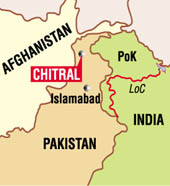 |
 |
| A young Kalasha girl in the valley of Rumbur, 350 km north of Peshawar. (Reuters) |
In the north western corner of Pakistan lies the Kalash valleys, home of the non-Muslim tribe Kalasha — considered descendants of Alexander the Great .
The Kalasha are the last to resist conversion to Islam in the Afghanistan-Pakistan border area. However, the tribe, which traces its ancestry to the Greek conqueror, has seen its numbers dwindle to roughly 4,000 owing to the ravages of time. They are outnumbered by immigrant and converted Muslims and most of them tend fields and fruit orchards.
Chitral town, a Pakistani tourist hotspots, is the gateway to the Kalash valleys — Rumbur, Bumburet and Birir. Located at the foothills of the Karakoram mountains, these areas and their inhabitants have been shrouded in mystery.
The Kalasha women — also called Kafirs — wear long black dresses, brightly decorated with embroidery on the bodice and hemline. The dress is pulled in at the waist, with a long, thickly woven sash. Layers of red, yellow and white beads weigh heavy on their necks. The women plait their hair into five strands, with the middle strand knotted in the front. Beads, cowry shells and buttons are stitched onto elaborate head bands which crown the Kalasha woman’s head and runs down her back to her waist.
The men dress less distinctively in the traditional Pakistani salwar kameez and Chitrali woollen cap decorated with a flower or feather.
What sets the Kalasha apart from their neighbours, besides their attire, is their religious beliefs. The Kalasha believe the earth is heaven, for the gods have given them everything they need — food, shelter, trees, water and life. Their religion, based on nature, has Koda (Sajigor) as its major deity. To mark four seasons, the Kalasha celebrate four festivals — even in sub-zero temperatures in winters — involving religious rituals, music and dancing. In summers, women spend most of their time irrigating the corn fields and harvesting the wheat while the men graze their goats.
Wine-making is another passion of the people.
Like their religion, the social customs of the Kalasha are also reminiscent of early agricultural communities.
For instance, the Kalasha have houses, known as the “Bashali”, where women are sent during their menstrual period — as they are then regarded as impure, and therefore, unfit to interact with men.
It is also the place where they give birth to children and reside for one or two weeks after their delivery.
The valleys also have their own traditions of celebrating marriages — with bride price, rather than dowry being the prevalent custom.
The bride price is usually in the form of goats and other smaller gifts. Polygamy is allowed, up to two wives, but rarely practiced.
Marriages are usually arranged when the boy and girl are still very young. The parents hold a special ceremony once as the girl reaches puberty.
However, men and women also have the freedom to choose their life partner. The girl leaves her home during a festival, officially making her statement to the entire community.
Mourning of the dead takes on a rather festive look as the Kalasha believe it was God’s decision to send the soul of the dead to the place where he or she belonged to.
A man’s death is accompanied by drumming, dancing and archery, whereas a woman is mourned by the family without any music.
The body is buried on the third day, by sunrise, followed by a “purification” in the river and the burial feast.
There are a few good hotels and restaurants but only jeeps can negotiate the narrow and rugged terrain.











